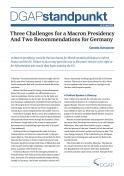If the French presidential election brought relief to Berlin and other European capitals, the first round of voting marked a political earthquake that will reverberate across the entire continent.
Before the first round of voting in France on April 23, nervous Europeans feared the worst: a possible run-off between two extremist candidates, Marine Le Pen on the far right and Jean-Luc Mélenchon on the far left. So the fact that the pro-European, independent candidate Emmanuel Macron won the largest share of votes provided some consolation. Interestingly, however, Marine Le Pen’s strong finish in second place caused comparatively little public concern.
Times have changed. Back in 2002, the unexpected success of Le Pen’s father in the first round of the presidential elections sent shock waves through the European Union and France. People took to the streets in spontaneous demonstrations, brandishing signs that read “J’ai honte” (I am ashamed). Nothing of the sort happened this week in France. Commentators and observers concentrated on the newcomer Macron. This shows just how entrenched the Front National has become in France. Indeed the party’s anti-European positions overlap with those of Mélenchon and other far-left and far-right candidates, who together won about 45 percent of the French vote.
If elected, Macron will be the youngest president in French history, with little previous governmental experience. And even if he already commands respect abroad, notably in Germany, the former economy minister will face an immensely challenging political job in his home country. There are at least three reasons for this, which in turn explains why France needs to stay high on the German and European agenda.
Click on the box at right to read the entire op-ed.
* A version of this editorial was published in Handelsblatt Global on April 25, 2017.

